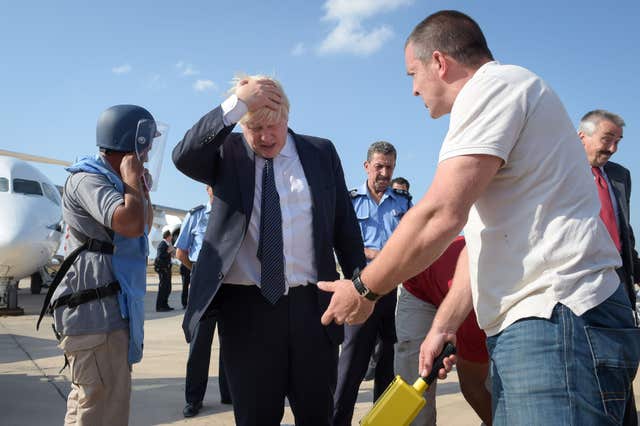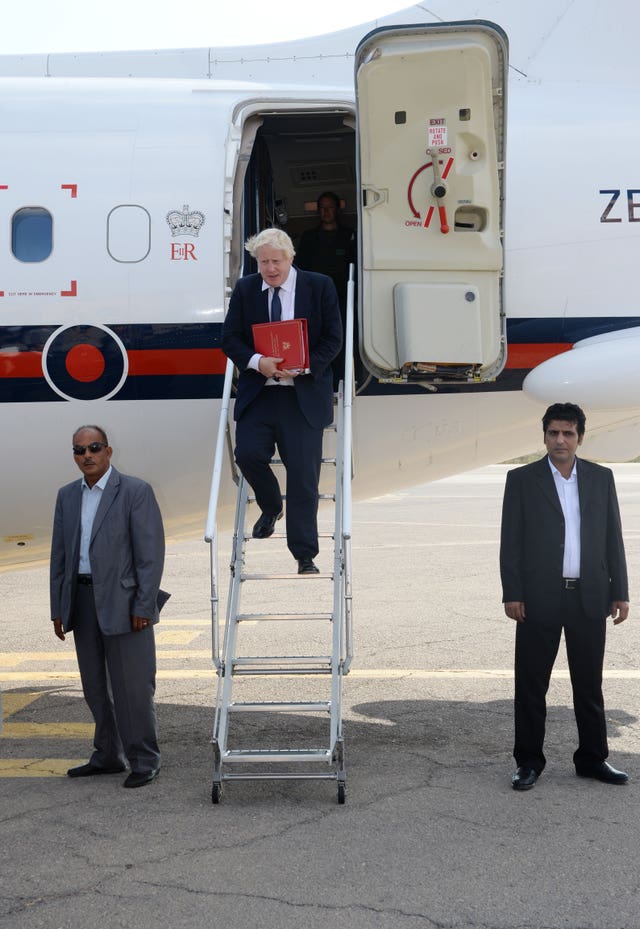Boris Johnson ‘sent to Libya for negotiations to extradite Abedi’, court told
Hashem Abedi’s lawyer claimed the then-foreign secretary was sent to Tripoli to speak to officials in an effort to secure the historic extradition.

Boris Johnson was linked to the alleged torture and unprecedented extradition of Manchester Arena bombing conspirator Hashem Abedi, it can now be reported.
In a move which briefly threatened to significantly delay the start of the seven-week trial before jurors had even been selected at the Old Bailey, defence counsel Stephen Kamlish QC asked the judge to consider any complicity of the UK Government in both Abedi’s alleged ill-treatment, and the extraordinary decision to hand him over to the UK for criminal proceedings.
Mr Kamlish – who was later sacked by his client – told the court how the then-foreign secretary Mr Johnson visited Libya in August 2017, three months on from the bombing, where Abedi was being detained following his arrest two days after the attack, which killed 22 and injured hundreds more.
Mr Kamlish cited a government press release issued following Mr Johnson’s visit to Libya, announcing a £9 million-plus aid package to support “stability” in the country, which was then followed by a historic Home Office request to extradite Abedi to the UK – something agreed by Tripoli despite its previous refusal to hand over Libyan nationals to foreign jurisdictions.

Abedi, who was born in Britain to Libyan parents, said he was tortured while being held in his parents’ homeland, though defence requests for details of any discussions between Mr Johnson and officials in Tripoli about the Abedi case were “ignored” by the Crown, Mr Kamlish said.
He said there were some 80 questions he felt the Crown had not answered relating to the matters of alleged torture and extradition, involving alleged complicity by the UK.
Addressing the court on January 27, the day the trial opened with legal arguments, Mr Kamlish said: “They (the Crown) cannot show the extradition was lawful.
“Their reason for not having to do so is ignoring the obvious – that British authorities were negotiating with Libya, including sending the foreign secretary to Libya – before a decision was made.”
The court was told how Abedi had fled the UK a month before his brother Salman detonated a suicide vest as music fans left an Ariana Grande concert, and was arrested two days later in Libya.
Within days, he was probed by “Libyan torturers” about Manchester, people who lived there and specific addresses in the city – intricate lines of questioning which could have only been passed to interrogators from the UK, Mr Kamlish said.
British officials were also aware of Abedi’s complaints of “extreme torture” – including concerns raised by his brother Ismail – long before an application to extradite him to the UK was made, the court was told.
The court heard there was clear evidence of what Abedi described as “systemic torture” by those responsible for detaining him, and that he was mistreated “most days” from his arrest to his “confession” two months later.

“This was and must have been known to be a notorious torture establishment, where people were tortured and killed,” Mr Kamlish said.
“It would be obvious to HM Government and representatives when the visits took place that he was in fact being tortured.
“Once they were told that he was being tortured, we submit that any use of method of torture confession, any answers he gives, render certain evidence in this trial inadmissible.
“There is an argument, a whole line of inquiry, that information obtained under torture should not be relied upon in court.”
He added: “After the torture was clear, the British Government do nothing to stop it, then applied for his extradition.
“If the British were playing a game around the torture and making the application quite late on, this is a matter to really bring to the court.”
Mr Kamlish challenged the Government to “stand in court” and swear it was “not complicit in torture”.
Duncan Penny QC, for the prosecution, described the argument as being based on a “totally false assumption”, and ruled out “underhand tactics” from London.
“It (the allegation) might have teeth if there were evidence of British Government involving itself in underhand tactics to seek to influence Libyan judges or politicians.
“But the fact is these are proceedings which ultimately resulted in the order of the court.
“There is no evidence here that the defendant was deprived of due process in Libyan proceedings.”
The judge, Mr Justice Jeremy Baker, said there was “no reason to believe the prosecution hasn’t carried out its duty”.
In a statement, a Home Office spokesman said: “Hashem Abedi was extradited in line with strict legal requirements, and the defence counsel themselves abandoned their arguments regarding this process.”
In the 2017 Foreign Office press release, Mr Johnson described how Libya was “the front line for many challenges which left unchecked can pose problems for us in the UK – particularly illegal immigration and the threat from terrorism”.
During his visit, Mr Johnson met Libyan prime minister Fayyez al-Sarraj, foreign minister Mohamed Siala and the then-president of Libya’s High State Council, Abdulrahman Swehli.





